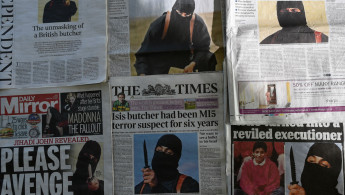IS' Jihadi John 'likely' dead after US drone raid
Sources in Raqqa have said that "Jihadi John", the masked Islamic State group militant with a British accent seen in grisly videos executing Western hostages, has been killed in a US drone in the centre of in Raqqa, Syria.
Activists say that the rocket hit the centre of IS' self-declared capital, and that the militant was killed in Raqqa's "execution square".
The Pentagon confirmed that it had carried out an air raid against Mohammed Emwazi - "Jihadi John's" real name - had been killed.
A senior military figure told BBC that there was a "high degree of certainty" that Jihadi John was hit in the attack, while another official told Fox News that Washington was "99 percent sure" that Emwazi was killed in the drone strike.
"We are assessing the results of tonight's operation and will provide additional information as and where appropriate," said Cook.
Speaking from Baghdad to members of the media in the Pentagon briefing room in Washington this afternoon, Colonel Steve Warren of the US army said that they were "reasonably certain" he had been killed but it would "take time to formally declare success".
Warren said Emwazi's death would be significant for IS because he was a primary recruitment tool for the group.
British Prime Minister David Cameron urged caution about reports that Emwazi was dead.
"We cannot yet be certain that the strike against Jihadi John was successful," the prime minister said.
|
— David Cameron (@David_Cameron) November 13, 2015" style="color:#fff;" class="twitter-post-link" target="_blank">Twitter Post
|
Cameron later went on to describe the drone attack as an "act of self-defence. It was the right thing to do".
The UK's opposition leader Jeremy Corbyn has said that Emwazi should have been arrested and tried as a war criminal, sparking a debate about the legality of the drone strike.
The Pentagon said the drone strike took place in Raqqa, the Islamic State group's de facto Syrian capital.
"Emwazi, a British citizen, participated in the videos showing the murders of US journalists Steven Sotloff and James Foley, US aid worker Abdul-Rahman Kassig, British aid workers David Haines and Alan Henning, Japanese journalist Kenji Goto, and a number of other hostages," the Pentagon said.
CNN and the Washington Post, citing officials, reported that Emwazi was targeted by a drone.
Experts say it will be difficult to prove that Emwazi has been killed until IS declare him a "martyr".
Activists said that US-led air raids on IS-held Raqqa are continuing on Friday.
Word of the US action comes as Iraqi Kurdish forces backed by US-led air strikes blocked a key Islamic State group supply line with Syria in the battle to retake the town of Sinjar from the extremists.
| Read more: Kurdish flag raised in Iraq's Sinjar city centre |
A permanent cut in the supply line would hamper IS's ability to move fighters and supplies between northern Iraq and Syria, where the jihadists hold significant territory and have declared a "caliphate."
|
— الرقة تذبح بصمت (@Raqqa_SL) November 13, 2015" style="color:#fff;" class="twitter-post-link" target="_blank">Twitter Post
|
British national
Emwazi, a London computer programmer, was born in Kuwait to a stateless family of Iraqi origin. His parents moved to Britain in 1993 after their hopes of obtaining Kuwaiti citizenship were quashed.
Dubbed "Jihadi John" by UK and US media, he first appeared in a video in August of 2014 showing the beheading of Foley, a 40-year-old American freelance journalist who had been missing since he was seized in Syria in November 2012.
Video of the beheading, titled "A Message to America," sparked worldwide revulsion.
In it, IS declares that Foley was killed because President Barack Obama ordered air strikes against the group in northern Iraq.
Foley is seen kneeling on the ground, dressed in an orange outfit that resembles those worn by prisoners held at the US naval base at Guantanamo Bay.
Emwazi is dressed entirely in black and wears a mask.
Two weeks later, Foley's fellow US hostage Steven Sotloff was killed in the same manner, again on camera and by the same executioner with a British accent.
|
— الرقة تذبح بصمت (@Raqqa_SL) November 13, 2015" style="color:#fff;" class="twitter-post-link" target="_blank">Twitter Post
|
Sotloff's mother, Shirley Sotloff, told NBC News following word of Thursday's strike that she hadn't been informed about it and that, even if Emwazi had been killed, "it doesn't bring my son back".
"Who knows if he's gone," NBC News quoted her as saying. "I don't think there will ever be closure."
On November 16, IS said it had executed Peter Kassig, a 26-year-old US aid worker kidnapped in Syria in October 2013, again as a warning to Washington.
'Cold, sadistic, merciless'
"Jihadi John" was six years old when his family moved to London. He grew up in North Kensington, a leafy middle-class area where a network of Islamist extremists was uncovered in recent years.
As a child he was a fan of Manchester United football club and the band S Club 7, according to a 1996 school year book published by The Sun tabloid. He later went on to study information technology at the University of Westminster.
The university confirmed that someone by that name left six years ago, and said it was "shocked and sickened" by the allegations.
Court papers published by British media connected Emwazi to a network of extremists known as "The London Boys" that were originally trained by al-Shabab, Al-Qaeda's East Africa affiliate.
One hostage who fell under Emwazi's control in the IS group's hub in Raqqa talked of a "cold, sadistic and merciless" killer.





 Follow the Middle East's top stories in English at The New Arab on Google News
Follow the Middle East's top stories in English at The New Arab on Google News
![The UAE is widely suspected of arming the RSF militia [Getty]](/sites/default/files/styles/image_330x185/public/2024-11/GettyImages-472529908.jpg?h=69f2b9d0&itok=Yauw3YTG)
![Netanyahu furiously denounced the ICC [Getty]](/sites/default/files/styles/image_330x185/public/2024-11/GettyImages-2169352575.jpg?h=199d8c1f&itok=-vRiruf5)
![Both Hamas and the Palestinian Authority welcomed the ICC arrest warrants [Getty]](/sites/default/files/styles/image_330x185/public/2024-11/GettyImages-2178351173.jpg?h=199d8c1f&itok=TV858iVg)